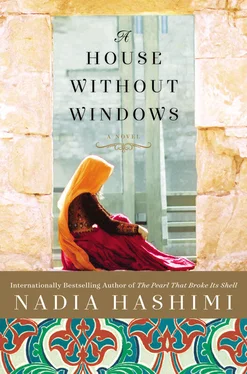Zeba felt her throat knot. She’d given them so little and received so much in return. They could return to their petty squabbles over who’d gotten more than her fair share of food or who had pilfered laundry detergent from her cellmate another day. Today, they gave the bickering a rest.
“God is merciful,” called another voice, just as a northern breeze sent a quiet rustle through the leaves of the arghawan tree at the corner of the yard. Even the fence glinted in the sunlight, looking more like radiant silver than harsh metal. “ Inshallah, He will hear our prayers. Have faith, sisters.”
Latifa broke the melancholy mood with one final couplet.
“If I’d known Chil Mahtab could bring me such joy
I would have happily let myself be used by a boy!”
A roar of laughter erupted, and hands clapped in delight. Zeba’s and Latifa’s eyes lit upon each other and they agreed, without breathing a word, that there was much to be thankful for, even on Judgment Day.
QAZI NAJEEB’S OFFICE WAS A TIGHT FIT FOR YUSUF, THE PROSECUTOR, Zeba, Gulnaz, and a guard. Mother and daughter squeezed into the floral armchair, Gulnaz’s hands wrapped around her daughter’s. She’d spoken with Tamina in the morning, she’d whispered to Zeba. They would be paying her a visit in the next day or so as the villagers had begun to cool their attacks on Tamina’s family.
The prosecutor twitched with nervous energy. He’d gone so far as to wear a tie for the occasion, even if it did remind him of a noose as he tightened the knot at his neck. He was eager to see this case come to a close. Yusuf sat opposite Zeba and Gulnaz, looking at his client from time to time to gauge her state of mind. She seemed more composed than he would have anticipated, but then again, she was a woman full of surprises. He tapped his foot and avoided looking at the prosecutor who sat to his right.
Qazi Najeeb had entered his office last, wanting to wait until everyone had taken their seats. Out of habit, he reached into his vest pocket as he moved behind his desk. His tasbeh was there, the beads rethreaded by his wife at his urgent request. He stole a glance at Gulnaz and decided to leave the string in his pocket. He coughed twice, the end of his turban bobbing with the movement of his head. He cleared his throat and looked at the papers on his desk as he began to speak.
“Today, I’ll announce the sentence of Khanum Zeba,” he said evenly and deliberately. “We’ve all spent our time working through this case, giving the victim the attention his death deserves. It is a tragic case. A husband is dead and a mother is in jail. Children are left without their parents. Sins have been committed and must be handled according to the law. There’s been much talk about mercy, but mercy is best left for Allah to manage.
“I’m sure you all know the saying: ‘Let justice find its rightful owner.’ It’s a common phrase though most people don’t know the story behind it.”
Yusuf squeezed his pencil between his thumb and index finger until the pads of his fingers went white. The way the judge said “justice” made his stomach drop.
“There was a thief who, just before dawn, was caught trying to steal food from the home of a decent family to feed his own children. Someone heard a noise and lit the wick of a lantern. When the man saw the burglar backing out of his window, he shouted so loudly that he woke his neighbors. The thief took off running, but half the neighborhood gave chase, swinging sticks and knives and whatever else they could find.
“The thief ran through the darkness and came upon the masjid . He thought he could hide out in the house of worship and ducked inside. As his luck would have it, the mullah had gone out to the stream behind the masjid to perform his ablutions. The thief slid into the mullah’s bed and pulled the blanket over himself just as the angry mob approached. They entered the masjid and assumed the man sleeping was the mullah. Just then, the mullah returned from his ablutions and was surprised to find an irate crowd of people. Seeing him return, they assumed him to be the thief and dragged him outside, waving sticks and fists at him. He denied being a thief and begged them to consider carefully before they imposed punishment upon the wrong man. He cried and beseeched them, ‘Let justice find its rightful owner!’ whereupon they chopped off his hand. It was the penalty for stealing. Amid the chaos, the sorry thief returned to his hungry family.
“On the occasion of the mullah’s death, he reached the gates of Heaven and met the angel of death. He asked the angel why God had allowed him to be punished for a crime he hadn’t committed and why the true thief had been allowed to go free. Where was the justice in that?”
The judge paused for a moment, allowing his audience to ponder the question. He cleared his throat and continued.
“The angel told him that the thief had only intended to feed his hungry family. As for the mullah, while he hadn’t been guilty of that particular theft, he’d once swatted a cricket and broken its fragile leg. It was a sin without witness but that made it no less of a sin. ‘Just as you said, my friend. Let justice find its rightful owner,’ the angel explained. What looked like injustice was actually justice overdue.”
Gulnaz flipped the end of her head scarf across her shoulder. She looked at Yusuf, who dared lift his eyes from the floor.
The prosecutor nodded intently, his eyes narrowed as he awaited the actual sentence.
“In this case, there has been much to consider, and as I’ve said all along in this case, I want to follow the laws that now govern our country. It’s the only way to move past the dark times when there was no order or when order was dictated by the individual. For that reason, I turned to the penal code.”
Yusuf blinked rapidly. He looked at the judge whose eyebrows were raised as he read through the lower part of his lenses.
“Article 400 of the penal code tells us that an individual who ‘kills another by mistake’ shall be imprisoned for up to three years or fined up to 36,000 afghanis.” Qazi Najeeb looked up, turning his gaze to Zeba. “From what I’ve seen, this woman did not have the intention of killing her husband. She had no plan nor had she made any statements to neighbors or loved ones that she was going to. Given her behavior and condition, we were even prompted to have her evaluated by an expert to assess her mental condition. She was determined to be in a very weak state and, after discussion with the mullah from the shrine, likely suffering from remorse. I do not believe she meant to kill her husband. I believe she meant to defend herself in light of his behavior — behavior that was both un-Islamic and illegal — and prevent her home from becoming a den of sin. It’s become clear that she intended to turn him in, which is why she’d approached the chief of police before her husband’s death. His deplorable behavior would have been punishable by law according to article 347, which makes blasphemy a crime.”
Yusuf felt a pounding in his chest to hear the judge citing specific articles from the penal code. The prosecutor’s face had contorted from a look of snide satisfaction to confoundment. How had things gone so wrong so quickly?
“And so, with Zeba having been found guilty, I have the responsibility to find an appropriate sentence for her crime, which I have decided will be the time she has already served in Chil Mahtab and a fine in the amount of one thousand afghanis.”
The prosecutor was on his feet, mouth agape. Yusuf’s nervous energy had taken him from his chair as well. If there had been more room in the judge’s office, he would have leaped on the back of the armchair. As it was, he turned to Gulnaz and Zeba to see if the sentence had registered with them.
Читать дальше











